2 Specific Strategies to Build Trust With Extra Cautious Prospects
If you sell in a market where safety must precede enticement, then you must be sure to soothe potential clients and built trust prior to sharing expertise and offers. How? By showing prospects your human side and not overwhelming them.
What do search marketers think of Enhanced Campaigns?
It’s worth noting that the research was carried out before the July deadline, but it transpires that the largest proportion of both agency (43%) and in-house (56%) respondents still weren’t sure what impact Enhanced Campaigns would have on paid search campaigns.
However for those that did have an opinion on the matter, a higher proportion of both companies (29%) and agencies (35%) thought that the change will have a positive effect on their paid search marketing.
Do you think ‘Enhanced Campaigns’ will have a positive impact on your/your clients’ paid search marketing?

Respondents were also given the chance to expand on their answers and give reasons for why they felt Enhanced Campaigns would have a positive or negative impact.
Positive opinions from the agency respondents included easy management, simplifying and streamlining campaigns. The overwhelming reason for agencies to answer that Enhanced Campaigns would not have a positive impact was, like for companies, the lack of ability to segment devices, especially not being able to run mobile-only campaigns.
Specific examples include:
- “[This] does not allow us to set up separate campaigns for devices which is fundamental to our strategy and targeting – this is a very bad move!”
- “Segmenting mobile/tablet/desktop visits has enabled us to achieve efficiencies in our campaigns which we fear may be lost with the roll out of enhanced campaigns.”
- “‘Enhanced’?? No, dumbed down. Yes, you will have fewer campaigns, but this actually lessens intelligence gained from analytics.”
- “Mobile campaigns are already standalone with a defined bid strategy across key terms. Consolidating this feels a backward step right now bearing in mind we have context as part of the strategy. ROI will no doubt be affected.”
Econsultancy’s Crunch – Data, Analytics and the Rise of the Marketing Geek, takes place on October 10 at Truman Brewery, London. Crunch is the event for the analysts, strategists and boffins who turns raw numbers into insight, then revenue. This event is one of five that make up our Festival of Marketing.
Gianluca Fiorelli’s Super Search Update – July edition
 Gianluca Fiorelli’s Super Search Update for July
Gianluca Fiorelli’s Super Search Update for July
Post from Gianluca Fiorelli on State of Search
Gianluca Fiorelli’s Super Search Update – July edition
Link Building A-Z Guide – Definitions & Terms
For search engine optimization newbies (including people who are both learning about building links and clients who seek link services), this helpful glossary will help define some of the more common link building terminology, from A to Z.
How one chippy can help your business capitalise upon the Chinese market

For a couple of years the owner of The Regency Seafood restaurant couldn’t understand why so many Chinese people couldn’t get enough of his battered cod.
What’s the attraction?
Robert Savvides, although grateful, was also rather confused, so asked some of his dinners what they loved about the place?
As you’ll see in the video, a famous Chinese chef visited the restaurant, enjoyed the food and wrote a sterling review on his personal blog.
We’ve been unable to locate the exact review, but another blog post is currently doing very well in the Chinese search results. Here’s the blog:

Naturally, what does every holidaymaker do before they board a plane? They do a little research around the attractions, tourist hotspots and most importantly, they want to find out about local food!
So when Chinese people search in Mandarin for “best restaurant in Brighton” via Google.com.uk or baidu.com, webpages about this charming little chip shop top the search results.
Here’s the top result in Google.com.uk

And the result for “Regency Restaurant” in Baidu.com:

The restaurant is clinching the top spots in the SERPS due to a variety of Google’s ranking factors, unbeknownto Mr Savvides.
But the important element of this story is that international SEO can help many UK businesses to benefit from the growing Chinese tourist market. This could be a lucrative opportunity for the smaller business failing to compete with the bigger brands here in the UK.
The Chinese Market
So why else are his dinners predominantly Chinese?
Well, more and more Chinese holidaymakers are setting their hearts on the UK, which will see an enormous econimical benefit. Britain already welcomes 149,000 Chinese holidaymakers a year, which is relatively low compared with the 1.1m who travelled to France in 2012.
Therefore, it is estimated that the UK misses out on millions of Chinese tourists, costing the UK economy an estimated £1.2bn in annual spend. So there is still some way to go, but the trend looks set to continue.
In one study, the data showed that Chinese tourists are the biggest spenders abroad. Chinese tourism spending has increased almost eightfold in 12 years, up from US$13bn.
There’s no denying that China is a big growth market. As more Chinese people decide to holiday here, it will be a good investment to make your business visible to this audience. This is an opportunity not to be missed.
Which types of business can benefit?
The types of businesses that will appeal to potential overseas travellers will be those related to the tourist and travel sector, such as:
- Restaurants
- Hotels
- And leisure
These are the types of things that everyone researches before booking their holiday, so I advise that you take stock of your online property to see which areas need to be reviewed to make them accessible on the somewhat tricky territory of the Chinese internet.
How can digital marketing help?
The global nature of digital marketing and SEO can help to expose your business to the growing Chinese UK tourist market.
The internet in China has been colloquially nick-named “The Great Firewall” so it wasn’t a surprise when the freedom of the net report 2012 ranked China’s internet as one of the most restricted in the world.
Google is not blocked entirely, but users who search for banned words are blocked from Google for 90 seconds.
According to an article written by Henry Fong, CEO of Yodo1, “China probably has more social media users than Facebook has in the entire world combined”. China has several very active social networks, yet they’re not those used by the West.
Liang says this isn’t a hindrance, as the video has shown you. With our in house knowledge, we can put together the right strategy to:
- Identify and utilise the right digital channels to put your business in front of 538m users.
- Help you overcome the cultural differences to communicate with the audience.
- Take advantage of the “great firewall” whilst other companies are yet to explore ways around it.
- Pin point the right bloggers with Google authorship and authority.
- How to respect censorship laws but at the same time penetrate the market.
The growing number of overseas visitors is definitely something that the small business should consider because, as we’ve seen from this seaside chippy, even the most unsuspecting business may be pleasantly surprised.
New CityMaps Hopes To Compete With Social And Editorial Content
Mobile mapping provider CityMaps recently redesigned its iOS app. It impressively includes home-grown vector maps, built from the ground up. Beyond this CityMaps is trying to offer deeper editorial and social content to differentiate from other mapping…
iOS passing referrer data again woo hoo
finally a small reversal of the tide of search data loss http://bowdeni.com/seos-rejoice-is-apple-now-passing-
read more
Having a CAPTCHA is Killing Your Conversion Rate
Posted by tallen1985
SEOs can occasionally find ourselves guilty of focusing on just the following few things:
- Links
- Rankings
- Fun cuddly animals that Google keeps releasing from its algorithmic zoo
Quite often we are heard muttering that user experience isn’t really our problem. We are all about the above three points. However, as the job of SEOs continues to become broader, requiring a greater number of skill sets, I think user experience is something we can all work on. Besides, surely if we focus some of our energy on this, we are going to end up with much happier users, which in turn will result in higher conversions.
There are various ways to work on improving user experience, and of course, conversion rate optimization also plays a part. Today, I want to focus on one specific part of user experience — CAPTCHAs (Completely Automated Public Turing test to tell Computers and Humans Apart) — and why I think they suck.
CAPTCHAs ask frustrating questions
When you encounter a CAPTCHA, you are being asked the question,”Are you a robot?” It’s like asking a customer who is about to enter a physical store, “Are you a thief?” before you allow them to walk through the door. So we used to flood our users with these “questions:”

And from there we have now moved to this:

Literally every time I see one of the above it makes me wish that this was on a nearby wall:

CAPTCHAs act as a barrier between you and your customers
Back in 2009, Casey Henry wrote a great post on CAPTCHA’s effect on conversion rates. He highlighted the fact that with CAPTCHA turned off, a company’s conversion rate would increase by up to 3.2%. It’s worth noting that the CAPTCHA type used in this test was based on the more traditional word format. That 3.2% is a pretty big potential gain for a whole lot of companies.

Traditional Word Format CAPTCHA
CAPTCHAs are not a solution, they are a problem
At the beginning of 2013 it was announced that Ticketmaster was finally ditching its traditional CAPTCHAs. Ticketmaster proceeded with an alternative system by SolveMedia. The system presents users with an image or video, the user then has to type a phrase associated with that image. In the video version of the product, a descriptive phrase will appear which the user then has to copy into a box below. If they are not willing to do this, they need to watch the video for a certain amount of time (similar to YouTube advertising) before continuing.

Right now, companies are producing variations of novelty products aimed at helping us to stop spam from landing in our inboxes. Many products claim they are aimed at improving the user experience by making this easier for humans. They come in a variety of styles, ranging from completing a simple sum to those that are image-based or even gamifying CAPTCHAs (such as Are You Human).
Yet all of these “solutions” create the same problem. I, the user, am trying to complete a purchase, fill in a form, or even just submit a comment. And you, the website, keep putting this frustrating technological barrier between myself and my goal, just so you don’t have to sort through a few items of spam.
Another major concern is that these products aren’t particularly user-friendly for those who are blind or partially sighted. Some simply offer the same audio CAPTCHAs (and problems) that we have been experiencing for as long as we remember.
CAPTCHA is built for advertising, not users
The key difference for me with image-based products such as SolveMedia and Minteye is that they seem to act as another opportunity to push an advert in front of users. In some cases they force you to watch an advert just to progress to the next page.
Users don’t want to see adverts even when they are “subtly” placed around a beautifully designed page. Yet, more and more we are moving away from giving the user a choice about viewing an advert to the point where adverts are forced upon them (ahem…YouTube).
So people must be ditching CAPTCHA, right?
Despite statistics like those shared by Casey Henry, the fact is that the use of CAPTCHA is actually on the increase. Perhaps for many webmasters this is just becoming common practice, almost the norm. After all, it’s a quick fix that means we, as webmasters, no longer have to worry about dealing with spam.
Figures from Drupal’s usage statistics show that they alone have nearly 200,000 people using one of their variants of CAPTCHA. This is a barrier to a more fulfilled user experience that doesn’t seem to be going away.

https://drupal.org/project/usage/captcha
“CAPTCHAs are designed to be easy for humans but hard for machines”
…according to a study carried out by Stanford University into the use of CAPTCHA by humans. Yet, by testing more than 1,100 people, gathering 11,800 completed surveys, and studying 14,000,000 samples from a week’s worth of data from eBay, they revealed just how difficult CAPTCHA has become for humans.
The study showed that, on average:
- Visual CAPTCHAs take 9.8 seconds to complete
- Audio CAPTCHAs take much longer (28.4 seconds) to hear and solve
- Audio CAPTCHA has a 50% give-up rate
- Only 71% of the time will 3 users agree on the translation of a CAPTCHA
- Only 31.2% of the time will 3 users agree on the translation of an audio CAPTCHA
With around 1% of the audience currently using audio CAPTCHA, this is potentially a huge market to lose.
So what is the solution?
There is a time and a place for CAPTCHA. For some sites, it may be unavoidable. However, any solution that is extremely effective rapidly becomes widely used, and as such, becomes a target for hackers.
There are some really simple solutions already out there that will help to reduce the amount of spam you receive but won’t interfere with your user experience.
Akismet
Akismet provides an effective defence that has no impact upon your users. It comes as a variety of plugins and is generally easy to implement on your site. Akismet monitors millions of sites, constantly learning new methods to beat comment spam.
The honeypot technique
Essentially, the honeypot technique is used to hide a field on a form from the user. If this field is then filled in, the chances are pretty high it was by a machine. The major downside to this method is that the form could be accidentally completed by a visually impaired user. Therefore, it might be useful to also label the field with something such as, “If you are human, don’t fill in this field”.
We still ultimately have the problem that whatever we do to ensure a user doesn’t fill in the form, a malicious script could perform its own interpretations by learning which labels mean that a field should be left alone.
However, the key benefit to this method is that the user isn’t getting punished by being asked to complete something that is irrelevant to their actions.
Is it time you ditched your CAPTCHA?
I think we need to focus on what creates a better experience for users by asking ourselves the following questions:
- Is the amount of spam you are receiving really worth potentially losing conversions?
- If the answer is yes, is your CAPTCHA friendly to all users, including those who are visually impaired?
- CAPTCHAs are for robots, not for humans. Unfortunately, anything one person can code to try and prevent robots from entering a site is something another can find a way through. The real consideration is, are we just shoving our problem with spam onto our customers?
When it comes down to it, CAPTCHAs lead to a negative experience on our sites. They frustrate users, damage conversion rates, and they are not particularly friendly to visually impaired users. Most of all, it is shifting our problem onto our users. That’s definitely not right. Getting rid of CAPTCHAs will not only improve our users’ experiences, but it will also improve the web as a whole. This should be the beginning of the end of the CAPTCHA. If you have a CAPTCHA, I urge you to remove it now!
What do you think?
Image credits
http://gizmodo.com/5980361/ticketmaster-is-dumping-awful-captchas
http://www.richgossweiler.com/projects/rotcaptcha/rotcaptcha.pdf
http://www.maggiesnotebook.com/wp-content/uploads/2010/11/Bang_Head_Here_25.jpg
Sign up for The Moz Top 10, a semimonthly mailer updating you on the top ten hottest pieces of SEO news, tips, and rad links uncovered by the Moz team. Think of it as your exclusive digest of stuff you don’t have time to hunt down but want to read!
Can Google Authorship Really Cause a Huge Traffic Drop? [Case Study]
One site owner claimed that adding Google authorship caused a drop in traffic and removing authorship triggered a Google retaliation in the form of an even more dramatic traffic drop. Is this possible, or could there be another “smoking gun”?
Need Help Getting Reviews? Its only $299/mo and a ‘little’ cheating
Google, in their ever increasing focus on reviews, has created a marketplace where abuse of their review system has economic rewards. This is not new but the companies working in the space getting reviews at any cost have become somewhat more sophisticated in circumventing Google’s filters and refining their pitch. And for as many opportunistic […]
Google Keyword(Not Provided) Now Over 50%
Most Organic Search Data is Now Hidden
Over the past couple years since its launch, Google’s keyword (not provided) has received quite a bit of exposure, with people discussing all sorts of tips on estimating its impact & finding alternate sources of data (like competitive research tools & webmaster tools).
What hasn’t received anywhere near enough exposure (and should be discussed daily) is that the sole purpose of the change was anti-competitive abuse from the market monopoly in search.
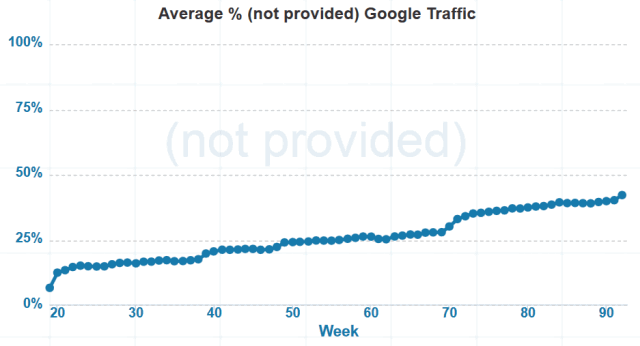
The site which provided a count for (not provided) recently displayed over 40% of queries as (not provided), but that percentage didn’t include the large percent of mobile search users that were showing no referrals at all & were showing up as direct website visitors. On July 30, Google started showing referrals for many of those mobile searchers, using keyword (not provided).
According to research by RKG, mobile click prices are nearly 60% of desktop click prices, while mobile search click values are only 22% of desktop click prices. Until Google launched enhanced AdWords campaigns they understated the size of mobile search by showing many mobile searchers as direct visitors. But now that AdWords advertisers can’t opt out of mobile ads, Google has every incentive to promote what a big growth channel mobile search is for their business.
Looking at the analytics data for some non-SEO websites over the past 4 days I get Google referring an average of 86% of the 26,233 search visitors, with 13,413 being displayed as keyword (not provided).
Hiding The Value of SEO
Google is not only hiding half of their own keyword referral data, but they are hiding so much more than half that even when you mix in Bing and Yahoo! you still get over 50% of the total hidden.
Google’s 86% of the 26,233 searches is 22,560 searches.
Keyword (not provided) being shown for 13,413 is 59% of 22,560. That means Google is hiding at least 59% of the keyword data for organic search. While they are passing a significant share of mobile search referrers, there is still a decent chunk that is not accounted for in the change this past week.
Not passing keywords is just another way for Google to increase the perceived risk & friction of SEO, while making SEO seem less necessary, which has been part of “the plan” for years now.
When one digs into keyword referral data & ad blocking, there is a bad odor emitting from the GooglePlex.
Buy AdWords ads and the data gets sent. Rank organically and most the data is hidden.
Subsidizing Scammers Ripping People Off
A number of the low end “solutions” providers scamming small businesses looking for SEOs are taking advantage of the opportunity that keyword (not provided) offers them. A buddy of mine took over SEO for a site that had showed absolutely zero sales growth after a year of 15% monthly increase in search traffic. Looking at the on-site changes, the prior SEOs did nothing over the time period. Looking at the backlinks, nothing there either.
So what happened?
Well, when keyword data isn’t shown, it is pretty easy for someone to run a clickbot to show keyword (not provided) Google visitors & claim that they were “doing SEO.”
And searchers looking for SEO will see those same scammers selling bogus solutions in AdWords. Since they are selling a non-product / non-service, their margins are pretty high. Endorsed by Google as the best, they must be good.
Google does prefer some types of SEO over others, but their preference isn’t cast along the black/white divide you imagine. It has nothing to do with spam or the integrity of their search results. Google simply prefers ineffective SEO over SEO that works. No question about it. They abhor any strategies that allow guys like you and me to walk into a business and offer a significantly better ROI than AdWords.
This is no different than the YouTube videos “recommended for you” that teach you how to make money on AdWords by promoting Clickbank products which are likely to get your account flagged and banned. Ooops.
Anti-competitive Funding Blocking Competing Ad Networks
John Andrews pointed to Google’s blocking (then funding) of AdBlock Plus as an example of their monopolistic inhibiting of innovation.
sponsoring Adblock is changing the market conditions. Adblock can use the money provided by Google to make sure any non-Google ad is blocked more efficiently. They can also advertise their addon better, provide better support, etc. Google sponsoring Adblock directly affects Adblock’s ability to block the adverts of other companies around the world. – RyanZAG
Turn AdBlock Plus on & search for credit cards on Google and get ads.
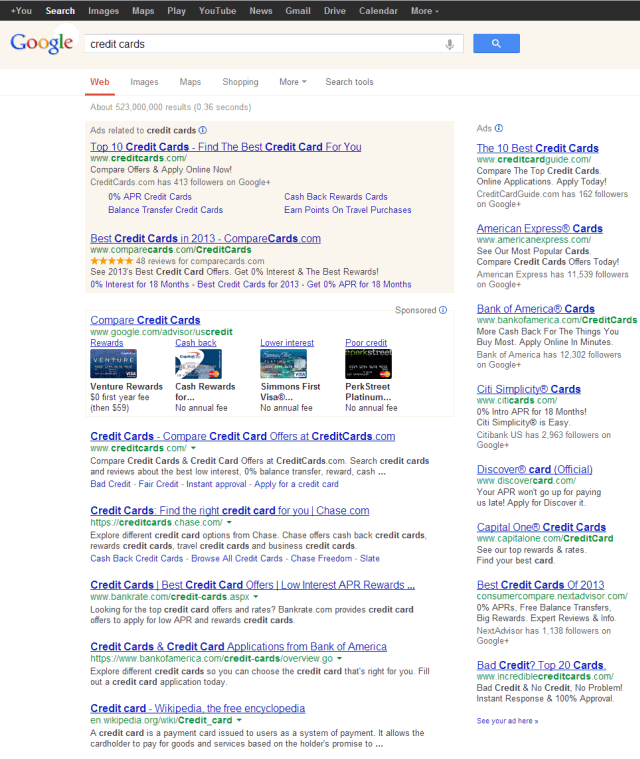
Do that same search over at Bing & get no ads.
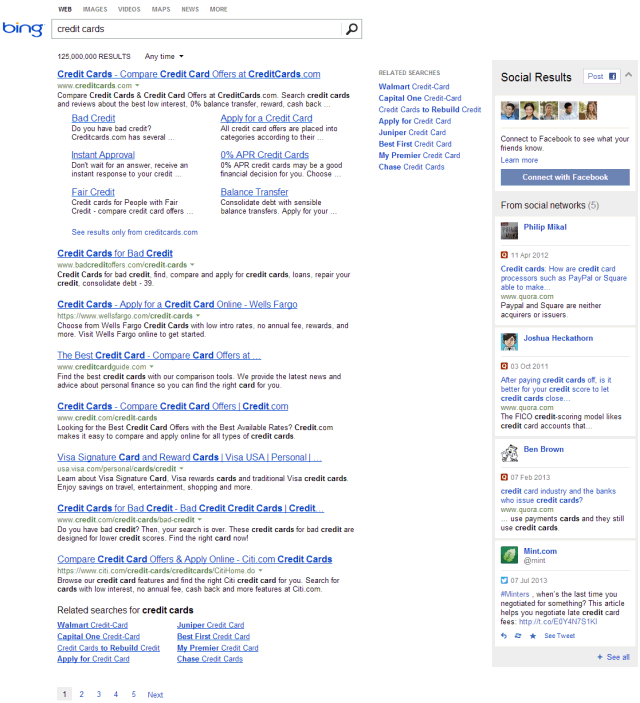
How does a smaller search engine or a smaller ad network compete with Google on buying awareness, building a network AND paying the other kickback expenses Google forces into the marketplace?
They can’t.
Which is part of the reason a monopoly in search can be used to control the rest of the online ecosystem.
Buying Browser Marketshare
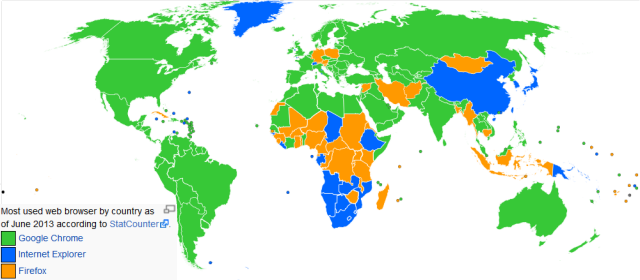
Already the #1 web browser, Google Chrome buys marketshare with shady one-click bundling in software security installs.
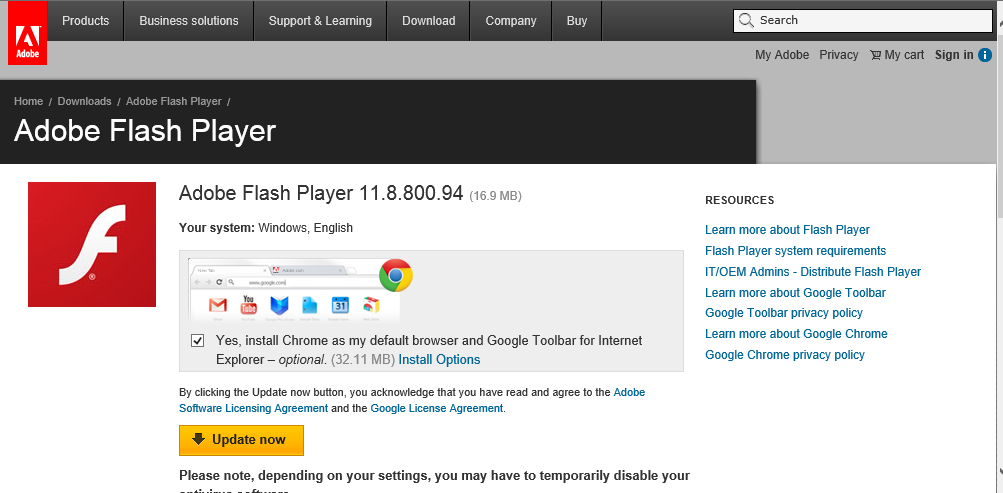
If you do that stuff in organic search or AdWords, you might be called a spammer employing deceptive business practices.
When Google does it, it’s “good for the user.”
Vampire Sucking The Lifeblood Out of SEO
Google tells Chrome users “not signed in to Chrome (You’re missing out – sign in).” Login to Chrome & searchers don’t pass referral information. Google also promotes Firefox blocking the passage of keyword referral data in search, but when it comes to their own cookies being at risk, that is unacceptable: “Google is pulling out all the stops in its campaign to drive Chrome installs, which is understandable given Microsoft and Mozilla’s stance on third-party cookies, the lifeblood of Google’s display-ad business.”
What do we call an entity that considers something “its lifeblood” while sucking it out of others?

SearchCap: The Day In Search, August 2, 2013
Below is what happened in search today, as reported on Search Engine Land and from other places across the Web. From Search Engine Land: Google Display Planner Tool To Replace Ad Planner, Placement Tool & Contextual Targeting Tool Google announced they are migrating three existing AdWords…
Please visit Search Engine Land for the full article.
Google Stifles Innovation, starts Strangling Itself
I’ve long claimed that Google’s efforts to regulate Internet publishing for it’s own commercial gain stifles innovation. I started this blog 2007 when it became clear that I needed to raise my profile as an SEO or get quietly destroyed via what could fairly be defined as anti-competitive practices. Google was getting big and […]
Google Display Planner Tool To Replace Ad Planner, Placement Tool & Contextual Targeting Tool
Google announced they are migrating three existing AdWords tools directly into a new version of the Google Display Planner. Specifically, the Contextual Targeting Tool, the Placement Tool and the Google Ad Planner are all going to be built into the Dis…
Revealed: The 17 Other Search Engines The FTC Warned Over Paid Ad Disclosures
In June, the US Federal Trade Commission warned seven “general purpose” search engines — including Google, Bing and Yahoo — about the need to ensure they were properly disclosing paid ads. But 17 other “specialty” search engines were also warned. Which ones? The…
Please visit Search Engine Land for the full article.
Pinterest Adds Price Drop Alerts
Pinterest has always been the place for users to pin a visual wishlist. Now, Pinterest is turning into a true e-commerce player. The social network has added a new feature that alerts users when prices on pinned items drop.
Video Recap of Weekly Search Buzz :: August 2, 2013
This week at the Search Engine Roundtable, we covered some important topics on search and marketing. First up, Google updated their links schemes guidelines and called out optimized keyword rich anchor text throughout it. They also made a splash by ca…
Search In Pics: Googlers At Apple & Microsoft Stores, Designer Glass & The Simpsons On Google Street View
In this week’s Search In Pictures, here are the latest images culled from the Web, showing what people eat at the search engine companies, how they play, who they meet, where they speak, what toys they have, and more. Google Interns At Apple’s Genius Bar: Source: Google+ Google Interns…
Please visit Search Engine Land for the full article.
Friday Talk: The Future of Marketing by Gerd Leonhard-FODM
We all want to be able to see into the future and make most use of it. And with an ever changing world it would be good to know a little about what’s coming. In this week’s Friday Talk Gerd Leonhard, Futurist & CEO of The Futures Agency talks about the next five years.
Post from Bas van den Beld on State of Search
Friday Talk: The Future of Marketing by Gerd Leonhard-FODM
Google’s Page Speed Insights Tool Updated
Ilya Grigorik, Google’s Developer Advocate for Google Chrome and all things speed on the web…